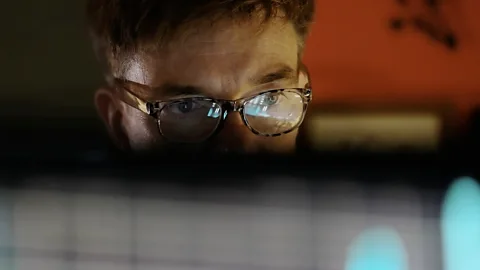How well do you think about risk and uncertainty?
 Getty Images
Getty ImagesOf all your education, a very few specific skills will determine the rationality of your decision making. Take our test to see if you have them.
No one can guarantee what the future will bring – but we can try to make an intelligent gamble on the available options.
Whether you are a doctor trying to decide whether to trial a new treatment, a CEO trying to forecast business post-Brexit, or you simply want to know how to interpret the weather forecast, the capacity to weigh up different potential outcomes is essential for good decision-making.
Unfortunately, many people are surprisingly bad at this. Luckily, a very short test – called the Berlin Numeracy Test – now allows you to assess your ability to cope with risk and uncertainty.
Before you read on, you might want to try the test yourself. It takes just five minutes to complete and at the end you will discover how your own “risk literacy” compares to the average person.
The test is the brainchild of Edward Cokely, now at the University of Oklahoma. He points out that mathematical skills have long been implicated in a wide range of outcomes – but they had not focused on the particular skills we need to understand many real-world situations.
Imagine, for instance, that you see the following advertisement for a new toothpaste (Zendil) that promises a 50% reduction in occurrence of gum inflammation, compared to people using a different toothpaste.
Which one of the following would best help you evaluate how much a person could benefit from using Zendil?
1. The risk of gum inflammation for people who do not use Zendil
2. The risk of gum inflammation for people who use a different brand of toothpaste for the same purpose
3. How many people there were in the group who used a different toothpaste
4. How old the people who participated in the study were
 Getty Images
Getty ImagesThe correct answer is 1 – the risk of gum inflammation of people who don’t use the toothpaste. For instance, if only two people every hundred normally suffer from inflammation using the other toothpaste, then a 50% reduction would mean that only one person in every hundred enjoys healthier gums – suggesting that it offers little benefit for the vast majority of people. (You can see a more in-depth explanation of ‘relative’ and ‘absolute’ risk at this website.)
Or imagine there is a 30% chance of rain tomorrow. Which of the following alternatives is the most appropriate interpretation of the forecast:
1. It will rain tomorrow in 30% of the region.
2. It will rain tomorrow for 30% of the time.
3. It will rain on 30% of the days like tomorrow.
The third answer is correct, but many people interpret this kind of information as meaning that it will rain for 30% of the day.
The Berlin Numeracy Test measures your capacity to make these kinds of judgements. Cokely and a team of colleagues originally developed the test at the Max Planck Institute for Human Development (hence the name). And despite the fact that the test only takes a few minutes to complete, he has shown that it can predict performance on many other, more involved, measures of decision-making accuracy.
You may also like:
For example, Cokely has worked with Rocio Garcia-Retamero at the University of Granada to show that risk-literate people are less susceptible to a wide range of common cognitive biases, such as overconfidence (our tendency to believe that we know more than we really do) and the sunk-cost effect (our tendency to pursue a failing project, even if the cost of continuing will be greater than the losses already incurred).
 Getty Images
Getty ImagesCrucially, these advanced decision-making skills also translate to real-life behaviour, such as people’s abilities to understand the results of a home HIV test. People who score well on these kinds of numeracy tests are also four times more likely to seek help within the first hour of experiencing the symptoms of heart failure – and this decision, in turn, determined their prognosis afterwards. The Berlin Numeracy Test also seems to capture people’s understanding of different investment plans and their capacity to evaluate adverts and understand political polls.
It’s important to note that neither the Berlin Numeracy Test, nor any of these particular decision-making tasks, rely on highly specialised or advanced knowledge beyond what you should learn at a secondary (high) school. But the very basic understanding of risk and uncertainty apparently leads you to become more reflective about the information you consume, creating a more rational and informed worldview. In technical terms, it seems to increase your “metacognition” – your capacity to question your own reasoning and judgements.
You might assume that the Berlin Numeracy Test simply measures intelligence, given that it relies on a basic command of numbers. But although the two are correlated, Cokely has shown that a capacity to understand risk turns out to be far better at predicting someone’s general decision-making abilities than typical IQ-style questions.
 Getty Images
Getty Images“When you look at the relative contributions, statistical numeracy has double the predictive power of other kinds of numeracy as well as the best measures of fluid intelligence,” he says. That’s particularly remarkable when you consider how little time it takes to complete the Berlin Numeracy Test.
Valerie Reyna at New York’s Cornell University has long argued that we need better understanding of risk, particularly when it comes to medical decision-making. “Many people do acquire these skills, but it’s still surprising to me how many don’t.” Numeracy does seem to be even harder to acquire than basic literacy, she says, particularly when it comes to mastering the deeper concepts. But for many, the problem is not that they lack the knowledge, but simply fail to understand when they need to apply it.
Unfortunately, these skills are of even greater importance today. “Nowadays patients are expected to make decisions, and they are given much more information than in the past,” she says. You might be given more data about the side effects of different drugs, for instance, when choosing a treatment option – a little like the example question above. Or imagine you have taken a test that reveals a genetic predisposition to certain kinds of cancer. Misinterpreting the risk could lead you to needlessly undergo surgery. “We want patients to be empowered to make decisions – but now that means the burden is on them to understand a lot more technical information, so that makes it particularly important that they are numerate and literate.”
Cokely is wary of making sweeping pronouncements on educational policy, but he agrees that given the personal and monetary cost of bad risk literacy, it should be a priority in schools. “For a society, working together, you could see how this could yield lots of economic benefits.”
--
David Robson is a science writer based in London. He Tweets as @d_a_robson and his first book, The Intelligence Trap, will be published next year.
If you liked this story, sign up for the weekly bbc.com features newsletter, called “If You Only Read 6 Things This Week”. A handpicked selection of stories from BBC Future, Culture, Capital, and Travel, delivered to your inbox every Friday.
